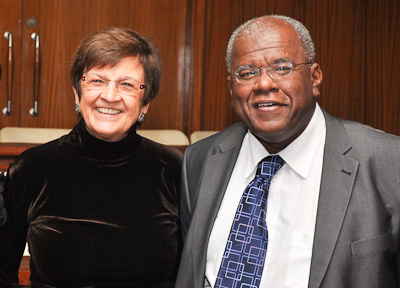Latest News Archive
Please select Category, Year, and then Month to display items
12 January 2024
|
Story Nonsindiswe Qwabe
|
Photo Sonia Small
 Since joining the UFS in 2008, Dr Grey Magaiza has worked extensively on approaches that can foster the socio-economic transformation of societies.
Since joining the UFS in 2008, Dr Grey Magaiza has worked extensively on approaches that can foster the socio-economic transformation of societies.
“The future should be one where communities can decide on their development agenda and futures. That’s the most important for me.” Dr Grey Magaiza, Deputy Director of the Centre for Gender and Africa Studies (CGAS) and Head of the Community Development programme on the Qwaqwa Campus, is passionate about capacitating communities to be agents of change and advancement. His vision for the future emphasises the empowerment of communities to take charge of their development by actively participating in decision making and the implementation of development projects that can improve their lives.
Since joining the UFS in 2008, Dr Magaiza has worked extensively on approaches that can foster the socio-economic transformation of societies. Over the years, he has crafted his research speciality into one that he is most proud of – being an interdisciplinary scientist immersed in the development of communities.
“I’m in a fortunate position of researching what I like. I say ‘fortunate’, because I’ve taken the time to understand what I’m passionate about, which is the overall field of rural livelihoods and livelihood futures – in short, community development. My research starts from an engaged university, understanding the elements that a university must use to enhance transformation and relevance to its immediate community in terms of development.”
One of the ways he has done this is by looking at social entrepreneurship as a development approach for young people in a rural setting. Through workshops with non-profit and civic organisations in Qwaqwa, Dr Magaiza has been helping these organisations to map out their needs and actively meet them through the involvement and support of external role players.
“We understand that communities are part of the national development agenda, but even that national agenda respects community knowledge and intentions and allows communities to shape their identity. A critical enabler of this is community organising. You bring back the capacity in communities to have dialogues on issues affecting them as spaces for engagement, knowledge exchange, and for people to just talk about their way forward.”
By enabling communities to define their development agenda, they can address their specific needs, challenges, and aspirations, he said. “When I look at livelihood futures, it’s quite an exciting aspect of my work – it’s like looking into a fortune tellers’ globe, because you’re not deciding for communities what they should do, but the communities themselves take those decisions.”
UFS Research Report launched
2010-08-25
 |
Seen here, are Prof. Nerad and Prof. Jansen
Photo: Stephen Collett |
The Directorate Research Development launched the University of the Free State’s (UFS) 2009 Research Report in August 2010. Prof. Frans Swanepoel, Director: Research Development, highlighted progress, future research development direction and several exceptional institutional research achievements, with special focus on the women researchers who are changing the face of research excellence at the UFS. Prof. Jonathan Jansen, Vice-Chancellor and Rector of the UFS, emphasised outstanding research performance as a fundamental element to the vision of the UFS and introduced Prof. Maresi Nerad, founding Director of the Centre for Innovation and Research in Graduate Education (CIRGE) and Associate Professor for Higher Education in the Educational Leadership and Policy Studies Programme at the College of Education at the University of Washington, Seattle, USA, as keynote speaker at the event. Prof. Nerad argued for a “global-village approach” to doctoral education, calling for a coordinated effort at many levels of higher education and beyond in supporting and developing our young researchers.